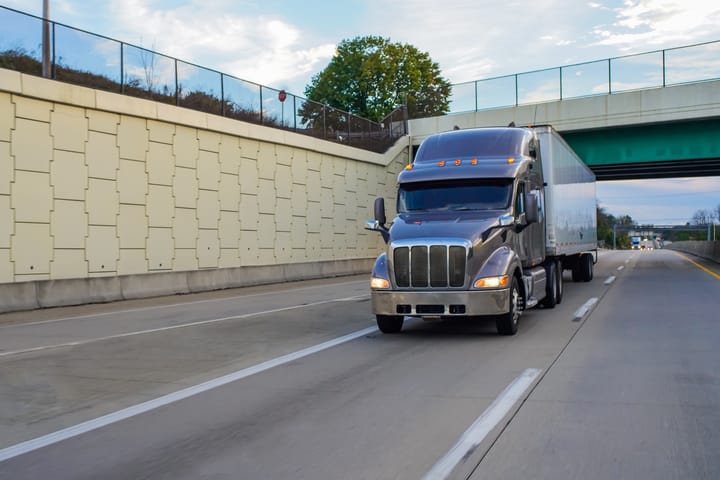How smart fleets stay profitable
Plus: Mack layoffs | C.H. Robinson’s AI shift

Stay focused, even when the market isn’t. Layoffs, tariffs, AI—it’s noisy out there. For carriers, the real challenge is staying disciplined when the pressure is on. Chasing short-term wins might feel like survival, but it can wreck long-term strategy. We talked to Warrior Logistics co-founder Malinda McFarlane about how small fleets can stay sharp, focused, and profitable—no matter what the market throws at them.
Meanwhile, Mack Trucks lays off hundreds, a family-owned fleet shuts its doors and a look at how the FMCSA's new ID check works (or doesn't work?). Plus, if you work with C.H. Robinson, keep reading to see how the 3PL's latest AI features might affect your loads and business.

Discipline: the secret to carrier success in a down market
In a freight market of depressed rates and tariff uncertainty, it can be tempting for carriers to chase whichever shiny object is in their peripheral vision. But that's a mistake, says one trucking company founder.
We chatted with Malinda McFarlane, co-founder and CMO of Warrior Logistics, a company with more than 150 trucks and brokerage services, who says network discipline is just as essential in a down market as an up one.
What's the biggest challenge for small trucking businesses in navigating the current freight market?
Network discipline. It is tempting in a down market to go anywhere or provide anything to chase "better" rates without giving full consideration to the overall economics and business implications of these short-term decisions. It is easy to get away from core operating principles and maintain one's network discipline. Small carriers have to be careful not to chase "the bright shiny object" but rather stay disciplined in their strategy and service that drives excellence.
What should fleet executives pay attention to related to tariffs?Our approach is related less to the price of the tariff but rather to what we term "customer intimacy." We believe strongly in understanding our customers' business and knowing where they may be challenged in the macroeconomics of the global supply chain. It helps us be proactive in managing our own exposure to those clients experiencing high tariff risk. For example, we have multiple customers in the steel and pipe industry. We have been proactive in managing our capacity with those experiencing port volatility and prioritizing those whose focus is on domestic manufacturers.
What's your top piece of advice to small fleets to stay profitable in today's market?
Be laser-focused on strategic investment. We make targeted investments in areas that position us for long-term growth; functions and capabilities that will enhance our scalability and service delivery when the market turns, thus providing above-average ROI. For us, more recently, this has been in technology efficiencies to better serve our customer base in the long haul.

EV transition? The time is not now
"The technology does not yet exist to transition to electric trucks."
That's according to an opinion letter penned by Jana Jarvis, president and CEO of the Oregon Trucking Association. Jarvis argues that the trucking industry is keen to find opportunities to transition to cleaner fuels and lower emissions, but EV technology isn't there yet. Range isn't up to par, and charging infrastructure hasn't been adequately built, says Jarvis.
Why this matters: Many states' Advanced Clean Trucks rules are in regulatory limbo at the moment. Trucking groups continue to advocate for a slower, more deliberate timeline to transition to electric vehicles.
Get more details at Oregon Live.

TRADE WAR: Canada drops tariffs for OEMs but with a catch
BAD APPLES? Trucking owner says good drivers "a dying breed"
PAIR O' TRUCKS: Autonomous truck platoon traveling on I-70
DONUT DOUGH: Fleet says $769K invoices unpaid for donut delivery

"Ultimately, this helps... the entire industry in keeping our roads safe." -Alex Vanjani, FMCSA
The Federal Motor Carrier Safety Administration has a new ID check system that scans a driver's license and a person's face to verify identity, in hopes of preventing fraud and maintaining safety on the roads. Overdrive editor Alex Lockie spoke to Vanjani and demoed the new feature. Watch how it works in the video here.

DOT scraps greenhouse gas emissions rule
The Department of Transportation has repealed a Biden-era rule related to greenhouse gas emissions. The rule would have required states to measure and set targets to reduce emissions on federal highways. Several trucking and transportation groups applauded the repeal.
Why this matters: The Trump administration promised deregulation, and this move is one step in that direction. The ATA called the rule "heavy-handed," while supporters of the rule have said regulations are essential to curb transportation emissions. (The Trucker)
Mack Trucks lays off hundreds due to tariffs, demand uncertainty
Mack Trucks plans to lay off 250-350 workers at a Pennsylvania plant. The OEM is blaming an uncertain market, tariffs and possible decreases in freight demand for the layoffs.
Why this matters: Tariffs and the uncertainty surrounding them are having a ripple effect on businesses. With shippers treading cautiously on imports, carriers are feeling the effects and may be hesitant to make big investments like new trucks. And OEMs are reacting accordingly. (Fleet Owner)
Family-owned fleet shutters after nearly 50 years
Davis Express is closing its doors and stopping deliveries this week. The family-owned trucking company, which had been in business for 44 years, said rising costs and flat rates were behind its decision to shutter the business.
Why this matters: It's tough to see small businesses built through decades of hard work be forced to shut their doors. The realities of the current freight market dictate that capacity needs to decrease before rates can rise. (Penn Live)

C.H. Robinson beefs up AI for freight matching
If you email C.H. Robinson about your capacity, AI might process the info. The 3PL is using AI to extract details about available trucks and match it to shipper requests in real time.
Why this matters: AI in the logistics world is all about speed and efficiency. The faster CHR can get information from shippers and carriers loaded into the system, the more it can match loads with capacity. It's a win-win, getting shippers' freight on the road quickly and reducing empty miles during backhauls for carriers. (Trucking Dive)

Trump axes Drug Testing Advisory Board
The Trump administration has terminated a board that oversees federal drug testing programs and labs that process drug tests. Specific to trucking, the Drug Testing Advisory Board played a hand in the development of a rule that would let carriers test drivers using a hair sample.
Why this matters: The board's advisory nature means exactly that—it advised, not regulated—but one ATA director noted the elimination of the board "could slow the integration of new scientific findings into federal drug-testing policies and standards." (Transport Topics)

Thanks for reading today's edition! You can reach the newsletter team at editor@theinsidelane.co. We enjoy hearing from you.
Interested in advertising? Email us at newslettersales@mvfglobal.com
The Inside Lane is curated and written by Shefali Kapadia and edited by Bianca Prieto.





Comments ()